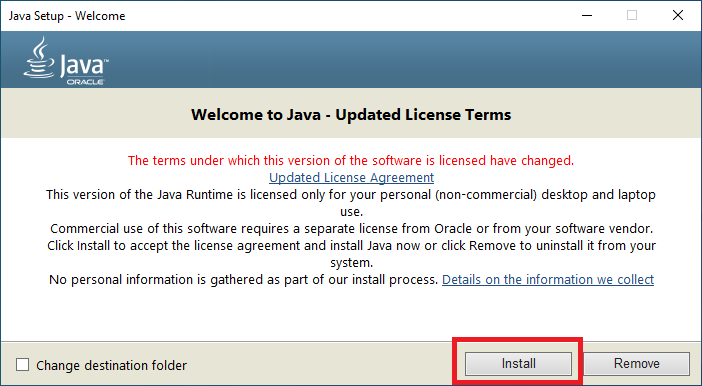

- HOW TO GET JAVA RUNTIME ENVIRONMENT MAC FOR MAC OS
- HOW TO GET JAVA RUNTIME ENVIRONMENT MAC INSTALL
- HOW TO GET JAVA RUNTIME ENVIRONMENT MAC UPDATE
If your Mac is blocking the installation of Java, follow these instructions to disable rootless SIP and try again:
HOW TO GET JAVA RUNTIME ENVIRONMENT MAC INSTALL
Java has such a bad rep on Macs that Apple has made it increasingly difficult to install it and other things that can potentially damage OS X. If you run into problems during the installation of Java, it’s because Apple has added an extra layer of security to Macs known as Rootless SIP. Java Installation Problems in El Capitan, Sierra & High Sierra
HOW TO GET JAVA RUNTIME ENVIRONMENT MAC UPDATE
If you find that you already have Java 1.6 installed, scroll down below “How to update Java 6 in El Capitan” as you also need to install a special update from Apple. If Java is on your Mac, you’ll see a message saying something like “Java (TM) Runtime Environment” in this case version 1.6 (or Java 6 as it is commonly known). If you’re not sure whether Java is installed on your Mac, simply search for Terminal in Spotlight and type: java -version at the command prompt. If you’ve never installed Java on Mac, then you can simply download and install the latest version of Java from Oracle which is known as Java 8 but rather confusingly officially called Java 1.8 by Oracle. It’s because an application you have installed or a website you’re trying to access requires Java to launch or work properly. Then relaunch the browser and try again to access the site.To use the “java” command line tool you need to install a Java SDK
HOW TO GET JAVA RUNTIME ENVIRONMENT MAC FOR MAC OS
Java 7 is available only for Mac OS 10.7 and higher.

Awareness: Java 6 is no longer receiving security updates from Apple. Local applications may require specific Java versions.

NOTE: Users should consult with their local IT support provider before installing or upgrading Java. On Macintosh Google Chrome is incompatible with most Java web applications and web pages that use a Java applet, due to the fact that the Java plugin is 64-bit and Google Chrome is 32-bit.After installing or upgrading Java, completely quit, then relaunch the web browser.Step Two: Verify that java is enabled in your web browser Upgrade to the most recent java version.Awareness: Once the java plug-in has been installed, it must be kept up to date in order to avoid security risks.Users should consult with their local IT support provider before installing or upgrading Java.Important information about installing the Java plug-in


 0 kommentar(er)
0 kommentar(er)
